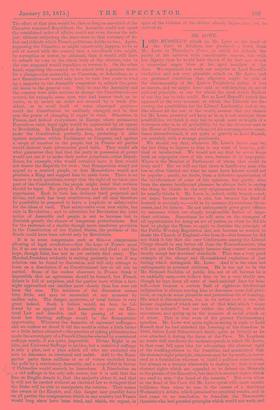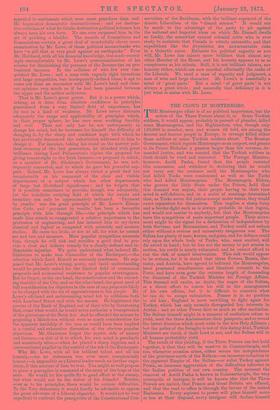MR. LOWE.
T ORD RUSSELL'S attack on Mr. Lowe as the head of 1 I the Cave of Adullam has produced a letter from Mr. Lowe to Thursday's Times, in which ho defends the purity of his motives with considerable success, but with less dignity than he would have shown if he had not struck a somewhat angry blow at his aged assailant at the close. We expressed last week our surprise at Lord Russell's vindictive and not very plausible attack on Mr. Lowe, and our profound conviction that, whatever might be said of the statesmanship of Mr. Lowe's Troglodyte policy, it was as sincere, and we might have said as self-denying, an act of political principle, as any for which the most sturdy Radical of our day has to take credit. But as Lord Russell's attack has appeared at the very moment at which the Liberals are dis- cussing the possibilities for the Liberal Leadership, and as we, like almost all the rest of the world, assume that any chance for Mr. Lowe, powerful and keen as he is, is not amongst those possibilities, we think it only fair to speak more at length of a statesman who is, in all probability, by fax the cleverest man in the House of Commons, and whom yet his contemporaries some- times misunderstand, if not quite so gravely as Lord Russell, yet certainly with a strange pertinacity.
We should say that, whatever Mr. Lowe's faults may be, the last thing to impute to him is any want of honesty, poli- tical or intellectual. We would not say that he never keeps. back an unpopular view of his own, because it is unpopular. Where is the Member of Parliament of whom that could be truly said ? But we will say that there is hardly any man who has so often blurted out what he must have known would not be popular ; partly, no doubt, from a defective appreciation of the invidiousness of some of his opinions, but partly, also, from the sincere intellectual pleasure he always feels in saying the thing he thinks in the very epigrammatic form in which he usually thinks it. Mr. Lowe is, indeed, oddly honest,—not, we hope, because honesty is odd, but because his kind of honesty is certainly so,—odd in its manner, its occasions, its ex- cesses, and its defects. He not unfrequently gives great offence by sarcasms which are simply irrepressible flashes of impa- tient criticism. Sometimes he will seize on the strangest of all opportunities for doing an act of justice, as when he did his best to pledge the House to apply to doctrine the principle of the Public Worship Regulation Act, not because he wanted to shake the Church of England—far from it—but because he did not think it fair that the easy Conformists among the Liberal Clergy should be any better off than the Nonconformists, who will not join the Church simply because they cannot conscien- tiously accept her doctrinal standards. That was a very good example of the abrupt and ill-considered explosions of just feeling which distinguish Mr. Lowe. And it is the same not unfrequently in personal criticism. He is too apt to be the Mr. Serjeant Snubbin of public life, not at all because he is an unkindly man,—we believe him to be a very kindly one, though he lays down all sorts of hard-and-fast lines for him- self,—but because a certain flash of righteous intellectual indignation is always moving him to denounce some dull plati- tude, or explode some plausible and pretentious bit of humbug. His mind is discontinuous, too, in its action ;—it is one, the keener impulses of which are not of that kind which " come to him in solitude," but are rather the offspring of social encounters, and spring up in the moment of social attack or of retort. This is true even of his greater Parliamentary speeches. Mr. Lowe was quite right in saying in reply to Lord Russell that he had attacked the lowering of the franchise in 1865, before Lord Palmerston's death, quite as bitterly as he ever attacked it during the times of the Cave. Mr. Leatham no doubt still recollects the sardonic speech in which Mr. Lowe, in that year, fell upon him for advocating the abstract right of the working-classes to the franchise, and maintained that the abstract-right principle, whatever may be its merits, is never used as a foundation whereon to build a political constitution, but always as a weapon wherewith to destroy it ; that it is not abstract rights which are appealed to to defend the Monarch or the person of the Executive, but that it is abstract rights which are used to arm "the hand of the assassin." Not even when at the head of the Cave did Mr. Lowe speak with more caustic brilliance than when he rose in the course of a desultory Wednesday's debate, which promised no practical results, and in fact came to no conclusion, to demolish the Democratic theorists who had paraded principles which would not work, and appealed to sentiments which were more grandiose than real. He deprecated democratic destructiveness ; and yet destruc- tive criticism of what he thinks destructive political schemes has always been his own forte. No one ever surpassed him in the art of pricking a bladder. The records of Committees and Commissions contain a great deal of wonderfully clever cross-
examination by Mr. Lowe, of those political mountebanks who have "0, pill that is very good against an earthquake." Even
Mr. Hubbard, with all his financial knowledge, was made exceed- ingly uncomfortable by Mr. Lowe's cross-examination of his scheme for diminishing the pressure of the Income-tax on pro- fessional incomes. In the collision of wits few ever van- quished Mr. Lowe ; and a man with vaguely right intentions and large sympathies, but inadequately-defined ideas, is apt to come out from an encounter with Mr. Lowe's hard and clear- eut opinions very much as if he had been pounded between the upper and the nether mill-stone.
That is Mr. Lowe's great power. But it is a power which, arising, as it does, from absolute confidence in principles generalised from a very limited field of experience, has its root in a kind of weakness. Mr. Lowe never distrusts adequately the range and applicability of principles which, in their proper sphere, he has once seen working forcibly
and well. Thus not only has he not unfrequently to change his mind, but he increases for himself the difficulty of changing it, by the sharp and confident logic with which he has previously denounced the exhortation addressed to him to change it. For instance, taking his stand on the narrow poli- tical economy of the last generation, he attacked with great brilliance during Lord Palmerston's regime the proposal for giving tenant-right to the Irish farmers,—a proposal to which, as a member of Mr. Gladstone's Government, he was sub- sequently converted, and to which he gave his powerful sup- port. Indeed, Mr. Lowe has always rested a great deal too complacently on his command of the clear and visible departments of a subject which has other departments of large but ill-defined significance ; and he forgets that it is possible sometimes to provide, though less adequately, for the indefinite outlying field of which the extent and
boundary can only be approximately indicated. Payment by results' was the great principle of Mr. Lowe's Educa- tion Code, and ' payment by results' has been a favourite principle with him through life,—the principle which has made him attach so exaggerated a relative importance to the profession of engineering, and has induced him to cry-down classical and logical as compared with scientific and modern studies. He cares too little, or not at all, for what he cannot see and test and measure. Mere popular sympathies nauseate him, though he will risk and sacrifice a good deal to pro- vide a clear and definite remedy for a clearly-defined and in- disputable injustice. We quite understand what induced Mr. Gladstone to make him Chancellor of the Exchequer,—the selection which Lord Russell so seriously condemns. He sup- posed that Mr. Lowe's strong, acute, and lucid understanding would be precisely suited for the limited field of economical proposals and economical resistance to popular extravagance. Rut he forgot, on the one hand, the sensitiveness and the exceed- ing timidity of the City, and on the other hand, the great need of full consideration for objectors in the case of any proposals likely to be charged with the sin of oppressiveness to the people. Mr. Lowe's off-hand and unforecasting mind led to collisions both with Lombard Street and with the masses. He frightened the powers of the Bank of England out of their wits by threatening that, come what would, he would never authorise a transgression of the provisions of the Bank Act. And he offended the masses by proposing a Match-tax without even so much consideration for the apparent hardship of the case as would have been implied in a careful and exhaustive discussion of the obvious popular objections. Mr. Gladstone forgot the mystic side of money and finance,—a side of it to which his own mind is peculiarly and sensitively alive,—when he placed a sharp logician and a conversational pugilist in the control of the ark of the Exchequer.
Why Mr. Lowe, with all his brilliant talent and all his honesty,—for no statesman was ever more conspicuously honest,—is impossible as a Liberal leader needs no further expo- sition, if this account of him be true. You might as well propose to place a porcupine in command of the army of the frogs or the mice. He would let his quills fly to good effect at the enemy, but what would not be the terror of his friends ? Besides, even as to his principles, there would be serious difficulties. To the Tory democracy it would hardly be advisable to oppose the great advocate of a Liberal oligarchy. It would not be very expedient to confront the panegyrists of the Constitutional Con- servatism of the Residuum, with the brilliant exponent of the drastic Liberalism of the " dismal science." It would not be much to the advantage of the party to pit against the national and Imperial ideas on which Mr. Disraeli dwells so fondly, the somewhat cynical colonial critic who is ever ready to maintain that Canada is utterly untenable, and that expeditions like the Abyssinian are unwarrantable risks in a Quixotic cause. Estimate his political sagacity as you will, Mr. Lowe has talents more brilliant than almost any other Member of the House, and his honesty appears to us as conspicuous as his talents. Still, it is not brilliant talents, nor honesty either, which can now marshal effectually the ranks of the Liberals. We need a man of sagacity and judgment, a man of wise and large character. Mr. Lowe's is essentially a mind of ' great parts.' But a mind of great parts' is not always a great whole ; and assuredly that deficiency in it is just what is amiss with Mr. Lowe.







































 Previous page
Previous page